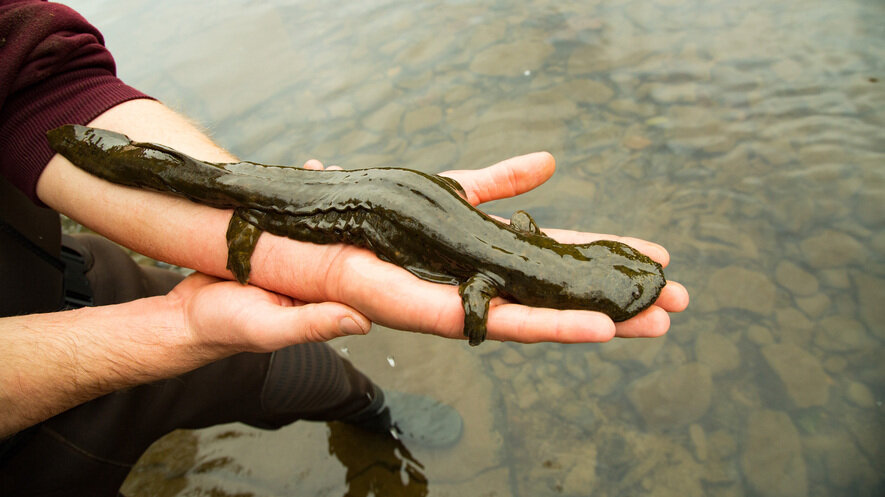
What is a Hellbender?
banner photo credit: Ryan Wolfe/Flickr, above photo credit: Lori Williams
What are they?
The eastern hellbender (Cryptobranchus alleganiensis alleganiensis) is the largest salamander in the Americas, and can grow up to 29” long! Hellbenders are mainly nocturnal, and can live 25 years in the wild.
Hellbenders have lungs for buoyancy in the water, but breathe entirely through their skin! That is why water quality is so important to their health.
These salamanders are NOT venomous, nor are they detrimental to trout populations. Hellbenders eat mostly crayfish, and are a great bioindicator of the health of a stream.
Where do they live?
Eastern Hellbenders are native to the Appalachian Mountains, ranging from southern New York to northern Georgia.
Specifically, Hellbenders thrive under rocks and boulders in cold, fast-moving water. They love the mountain streams in western North Carolina!
Hellbenders are a protected species in this state, because they are susceptible to habitat damage. Please don’t move rocks in creeks to create dams or cairns. This can slow down water circulation and oxygenation, stir up silt, and disturb the rocks that hellbenders and other salamanders shelter in.
photo credit: Lori Williams
Why are they in conservation?
If you are lucky enough to see one of these giant salamanders, it means the water you’re in is healthy!
Hellbender numbers have been declining because the health of their streams are being threatened. Warming temperatures, pollution in their water, and erosion muddying the streams are all factors affecting their habitats. Hellbenders were also historically killed because fishermen thought that hellbenders ate their trout, or were dangerous and venomous. None of this is true.
If you are fishing and accidentally catch a hellbender, gently remove the hook and release it. If you see a hellbender, leave it alone but note the location, take a photo, and email that information to Lori Williams at lori.williams@ncwildlife.org.
More Hellbender Resources:
Conserving Eastern Hellbenders - NC Wildlife
National Wildlife Federation - Wildlife Guide
National Geographic, by Jane Lee
Citizen Times, by Karen Chavez



